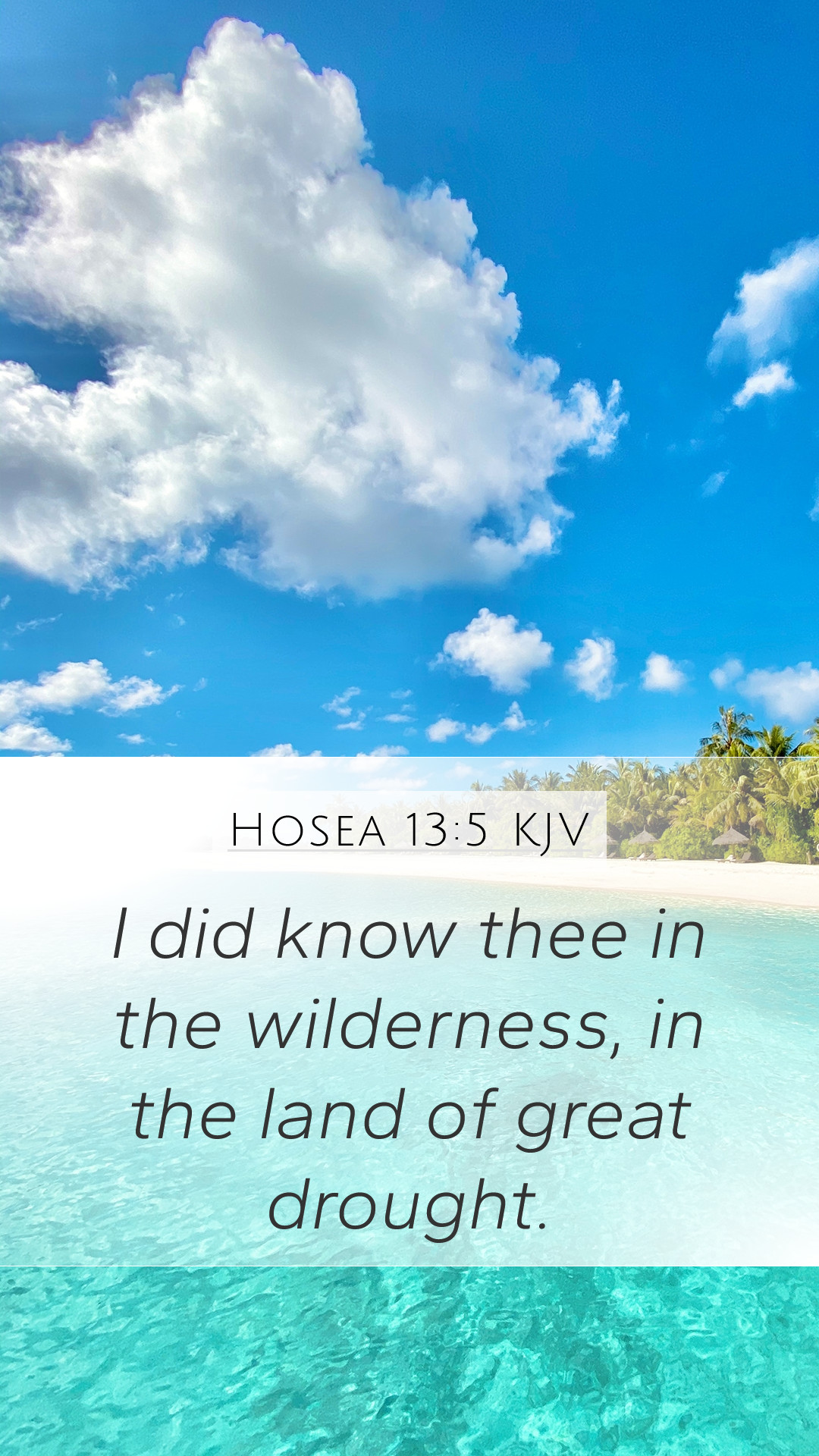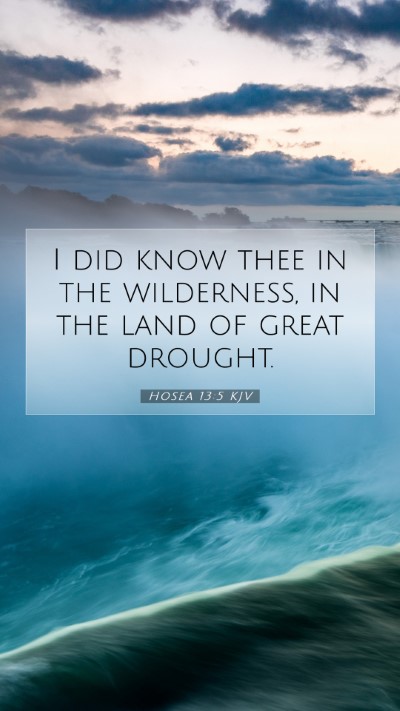Old Testament
Genesis Exodus Leviticus Numbers Deuteronomy Joshua Judges Ruth 1 Samuel 2 Samuel 1 Kings 2 Kings 1 Chronicles 2 Chronicles Ezra Nehemiah Esther Job Psalms Proverbs Ecclesiastes Song of Solomon Isaiah Jeremiah Lamentations Ezekiel Daniel Hosea Joel Amos Obadiah Jonah Micah Nahum Habakkuk Zephaniah Haggai Zechariah MalachiHosea 13:5 Meaning
What is the meaning of Hosea 13:5?
I did know thee in the wilderness, in the land of great drought.
Hosea 13:5 Bible Verse Meaning
Understanding Hosea 13:5
Bible Verse: Hosea 13:5
“I knew thee in the wilderness, in the land of great drought.”
Overview
The book of Hosea addresses the spiritual unfaithfulness of Israel, depicted through the metaphor of unfaithful marriage. In this particular verse, God recalls His intimate relationship with His people during a time of deep trial and adversity. This commentary provides an in-depth Bible verse explanation of Hosea 13:5, drawing insights from renowned public domain commentaries to enhance Bible study understanding.
Interpretation of Hosea 13:5
Hosea 13:5 reveals God’s past dealings with Israel when they were in the wilderness, emphasizing His protective and guiding presence during their most trying times. Below is a breakdown of the verse’s meaning:
- Historical Context: The wilderness symbolizes a period of hardship, where Israel was tested. It serves as a reminder of their deliverance and God’s provision during difficult times.
- Relational Aspect: The phrase "I knew thee" indicates a deep, personal relationship between God and His people, reminiscent of the covenant bond that forms the basis of their identity as God’s chosen.
- Spiritual Significance: The “land of great drought” refers not only to physical barrenness but also spiritual desolation that often accompanies turning away from God.
Public Domain Commentary Insights
Here are some significant insights drawn from the commentaries:
- Matthew Henry: Henry points out that God's awareness of Israel in the wilderness emphasizes His continual support and the faithfulness of God during Israel's unfaithfulness. God’s knowledge reflects deep care and vigilance, indicating that even in desolation, God's love is steadfast.
- Albert Barnes: Barnes reflects on Israel's history in the wilderness, noting that it was a formative period filled with miracles that illustrated God's grace. He emphasizes that the drought symbolizes both physical and spiritual droughts, significating Israel's disobedience and its consequences.
- Adam Clarke: Clarke provides insights into the metaphoric use of wilderness, suggesting that it signifies moral and social desolation that would follow disobedience. He emphasizes that God’s relationship with Israel was marked by connection and aid, even amidst dire circumstances.
Bible Study Insights
This verse can be utilized in Bible study groups to explore themes of divine love, faithfulness, and human unfaithfulness. It serves as an excellent starting point for discussions on how God communicates with His people and how they respond in times of spiritual drought.
Applying Hosea 13:5 Today
For modern believers, this passage prompts reflection on the nature of their relationship with God, especially in times of hardship. It encourages individuals to consider:
- How does God’s historical faithfulness inform our current faith and experiences?
- In what ways do we experience spiritual drought in our lives, and how can we seek God’s renewal?
- What steps can we take to deepen our relationship with God, mirroring the intimate knowledge God had of Israel?
Cross References
This verse connects well with several other biblical passages:
- Exodus 3:7-10: God's knowledge of Israel's suffering in Egypt.
- Numbers 14:34: God's understanding of Israel's 40 years in the wilderness due to disobedience.
- Deuteronomy 8:2-4: Reminder of God's test of Israel’s faith in the wilderness.
Conclusion
In summary, Hosea 13:5 reveals profound truths about God’s unfaltering love and the complexities of human faithfulness. This verse serves as a powerful reminder for anyone engaging in Bible verse commentary and seeking to deepen their understanding through Bible study tools and resources.


